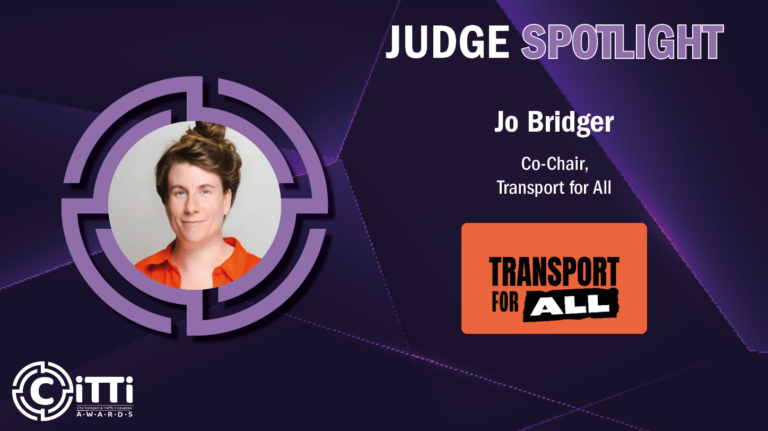With entries for the CiTTi Awards 2025 now open, City Transport & Traffic Innovation Magazine (CiTTi Magazine) has launched an exclusive series of Q&A interviews with the expert panel of judges responsible for assessing this year’s submissions.
In the weeks ahead, the magazine will shine a spotlight on each of the judges – a diverse group of leading professionals drawn from across the sustainable urban mobility and transport technology sectors – to explore their backgrounds, industry perspectives and what they’ll be looking for in an award-winning entry.
From public sector figures to academic and technical specialists, this year’s judging panel represents a broad spectrum of knowledge, insight and experience – all of which will help identify the most innovative, impactful and forward-thinking projects, products and people shaping the future of city transport and traffic innovation.
One of the judges taking part in the 2025 edition is Jo Bridger, co-chair ar Transport for All.
As the co-chair of a disabled-led organisation breaking down barriers to transport, so that all disabled people can travel with freedom, dignity, ease, and confidence, Bridger works towards creating equitable transport that is accessible to all.
She has extensive experience using transport systems in many different countries and contexts including helping to develop the Rail to Refuge scheme, providing survivors of domestic abuse free train travel to a refuge.
Bridger lives with sight loss, and since 2022 has worked in grants and data management. She is also passionate about seeing the leadership of disabled people in addressing the climate crisis.
Speaking to CiTTi Magazine, Bridger is focused on projects that can provide a tangible benefits to disabled people in a unique manner that help make public transport a smoother experience.

Name: Jo Bridger
Job title: Co-Chair
Organisation: Transport for All
How does your professional expertise align with the CiTTi Awards’ mission to recognise and celebrate innovation in urban mobility?
Disabled people make up a quarter of the UK’s population, but we make 38% less journeys than non disabled people, and when we do travel it costs us more – because of barriers which exist in more affordable or sustainable transport modes. Disabled people are powerful and capable, but we must be included in conversations on sustainability and the just transition, so that urban mobility innovation supports everyone’s access to travel.
I trained as a town planner, have been a passenger on public transport in cities all over the world, and seen how fast the UK rail sector moved when together with Women’s Aid we launched Rail to Refuge at the start of the pandemic.
Transport for All campaigns for true accessibility across transport modes to ensure disabled people are not physically and financially excluded from civic life. While we still need to fight for accessible stations and street design, and for equity across concession schemes, it’s right that we celebrate work that makes travel greener and easier for everyone. We are proud to be a visible, bold voice which shows that disabled people are part of society and part of the transport sector.
What emerging trends or technologies in urban mobility and transport are you most excited about, and how do you expect them to be reflected in this year’s submissions?
I first realised that I was losing my sight as a teenager on the Tube, when I wasn’t able to read the words on the maps within the carriages. I travel by train for work and pleasure, and can’t always see railway station display boards without assistive technology, so work that improves the accessibility of passenger information display systems for blind and partially sighted people, personally excites me.
Transport for All is a pan disability organisation, so I’m looking forward to judging submissions which have worked in co-production with a range of disabled people, and paid disabled people for their time and expertise, recognising our community as key partners in transport development.
As a judge, what insights do you hope to gain from reviewing the submissions, and how might this experience shape your perspective or influence your work in the sector?
I’m hoping that submissions for the Transport Accessibility and Inclusivity Award show a breath of good practice; covering consultation and collaboration. I’m hoping to find allies and good examples of work that raise the bar, that Transport for All can reference as good practice for others to emulate.
In your opinion, how do the CiTTi Awards contribute to driving meaningful progress and innovation in urban mobility, and why is industry recognition so important?
In a time where it’s so easy to say what’s wrong, it’s important to say what’s right! We all need hope, and examples to follow as we experience the climate crisis. For disabled people, our community is terrified of being forced into further poverty, by the threat of cuts to vital disability benefits, especially when travel costs can rise year on year. Not only do they provide financial support, but PIP acts as a ‘passport’ to crucial travel concessions. We use our disabled person’s bus passes and rail cards to get to work and be a part of society.
This potential downward spiral where removal of benefits is compounded by the removal of associated concessions will have a drastic impact on disabled people’s ability to make the journeys we want with freedom, dignity, ease and confidence. This makes the professional recognition of work which supports disabled people to access travel and transport equitably more important than ever.
Can you share an example of an innovation or initiative that has significantly impacted urban mobility?
The biggest initiative that has changed the face of urban mobility is the power of disabled people. It’s amazing to think that only 30 years ago, in 1995 buses, were not accessible for disabled people: people using mobility aids like wheelchairs and rollators could not board, and there were no announcements or displays showing stops.
That changed because incredible disabled protestors challenged the inaccessibility of our world. They secured the first Disability Discrimination Act – the foundation of today’s equality laws, and pushed our transport operators towards innovation.
There is still so much further to go. Today I’m proud to be a disabled person urging our transport operators forward towards a world where we can all travel easily and confidently.
What advice would you give to companies and organisations looking to submit an award-winning entry?
Read the Guide to Entry document fully and carefully! Judges will be using the guidance in this document to help make our decisions. Make sure there’s evidence for all of your claims; be honest – but don’t be modest! Tell us where you’ve had the most unique impacts and best collaboration. I’m really looking forward to judging applications.
Achievements and innovations in urban mobility will be recognised and celebrated at the fourth annual CiTTi Awards on 25 November 2025 at De Vere Grand Connaught Rooms in London. Visit www.cittiawards.co.uk to learn more about this unmissable event for the UK’s transportation sector!





